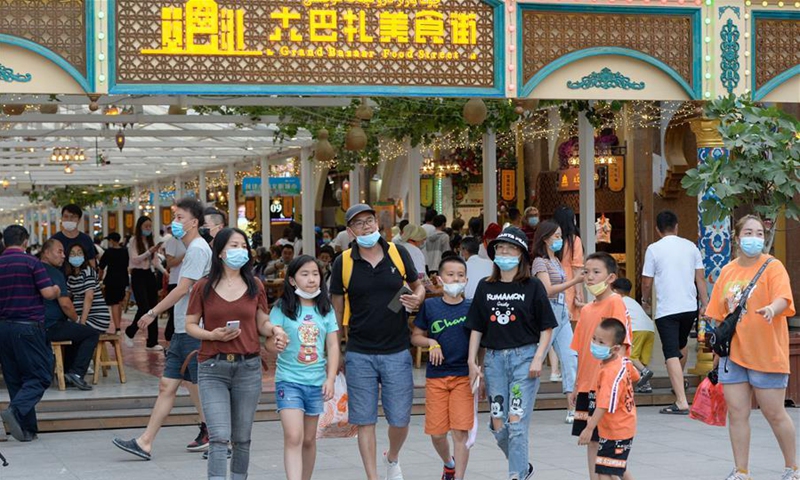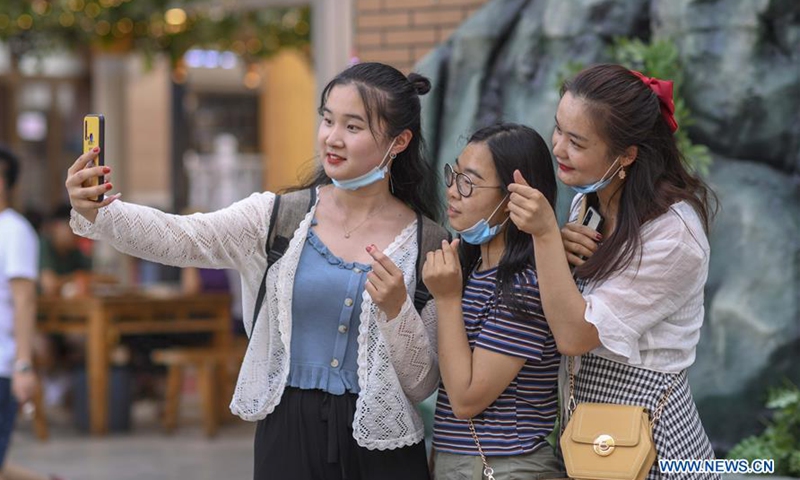NYT ‘Uygur labor’ report slammed
Attacks aim at China’s PPE industry, overlook people’s willingness to work

Tourists visit the Grand Bazaar Food Street in Urumqi, capital of northwest China's Xinjiang Uygur Autonomous Region, July 4, 2020. (Xinhua/Ding Lei)
"It is another piece of work interwoven with biased interpretations and unverified materials," experts said, in response to the New York Times' "investigation" that claimed Uygurs from China's Xinjiang are sent to make face masks against their will. Xinjiang residents, scholars and the face mask industry insiders reached by the Global Times said that the report is the latest version of hyping "forced-labor" fallacies in Xinjiang, which are aimed at attacking China's personal protection equipment industry.
The video was released against the backdrop of "whether to wear a mask" - a method that has been proven to be effective to prevent the spread of COVID-19 in many countries but was politicized by US politicians. Experts said that the NYT report may also mislead the Americans and give those who disagree with wearing masks an excuse, complicating the anti-virus fight in the US.
The visual "investigation" of NYT was released on Sunday. It said as Chinese companies rush to manufacture PPEs, Xinjiang is sending Uygurs and other ethnic minorities to factories. It traced two companies in Hubei and Jiangxi provinces which have employees from Xinjiang, and pointed out products from the companies have shipped to the US.
The NYT video extracts footage and pictures mostly from news released by Xinjiang local media, newspapers from Hubei Daily and local media in Jiangxi. It also added pictures of surveillance facilities, video of what seemed like inmates' transferring, and accusations of Xinjiang using "forced labor" in the textile industry at the end of the video.
"This is another piece of work interwoven with biased interpretations and unverified materials. Some Western media only 'find' materials that fit their predictions or purposes," Mao Junxiang, executive director and professor at the Human Rights Studies Center at Central South University, told the Global Times.
This aims to slander China's poverty alleviation policies in Xinjiang as transferring surplus labor in Xinjiang is an important way to increase local residents' incomes. Local governments in Xinjiang are offering employment information, channels and training to residents willing to work outside Xinjiang. The governments are guaranteeing residents' rights to work, Mao said.
So-called accusations over forced labor in Xinjiang purposely overlooked Xinjiang residents' willingness to work and pursue a better life, Zhu Ying, deputy director of the National Human Rights Education and Training Base of Southwest University of Political Science and Law, told the Global Times.
Zhu's school conducted a survey in Xinjiang which showed that most of the respondents are willing to work outside Xinjiang, as the salaries in many inland cities are higher, and their children can have a better education.
The NYT "investigation" gave no interview of anyone working in the factories it mentioned. Moreover, the Global Times also found the original reports which told a totally different story.
For example, NYT noted that Uygurs were sent to Songzi, Hubei to work at the Haixin sanitation supplies company. The report was made by Jingzhou Daily on December 5, which said that 132 Uygur women came to the company and lived happily there. One girl named Mekrem is from a poor family in Moyu, Hotan Prefecture. The new lifestyle encourages her to make more money and go to college.
Zhu said that the report attacks China's PPE industry and creates momentum for the US to squeeze import prices, or even seize the equipment under the excuse of "human rights stain."
US Customs and Border Protection officers detained a shipment of almost 13 tons of wigs and other human hair products suspected of being made through "forced labor" in Xinjiang, US media reported in early July.
As the US faces a deteriorating epidemic situation and huge demand for PPEs, it would take measures on China's products, and by using "human rights" and "forced labor" as excuses, the US would seize Chinese products and attack Chinese companies, Zhu said.
The US is politicizing the business, which is shameless and the accusation is unfounded. It also shows their absolute ignorance of the common sense of the mask industry, Bai Yu, president of the Medical Appliances Branch of the China Medical Pharmaceutical Material Association, told the Global Times.
Some US officials think we're using cheap labor, but more than 90 percent of our production lines are fully automated and do not require many workers. The cost of labor takes only a tiny fraction of a mask cost, Bai said.
"The US is completely ignorant of China's legal environment and labor system. Their way of thinking about production and management seems to be stuck in the days of slavery in their dark history."
Bai noted that about 80 percent of the world's masks are Chinese-made, which used to be around 50 percent before the outbreak. We have already supplied billions of masks to the US. In the past, the US government did not call for wearing masks because the supply was inadequate, but now it is a political issue if they do not to call for mask-wearing.
"Chinese factories are not particularly interested in orders from the US, because Chinese mask manufacturers, especially those qualified for export, do not have to sell masks to the US, when they can sell them to other countries with no political bias on Chinese suppliers and products. So in this case, it is the US who comes to us asking for masks, not us asking for their orders," Bai said.


